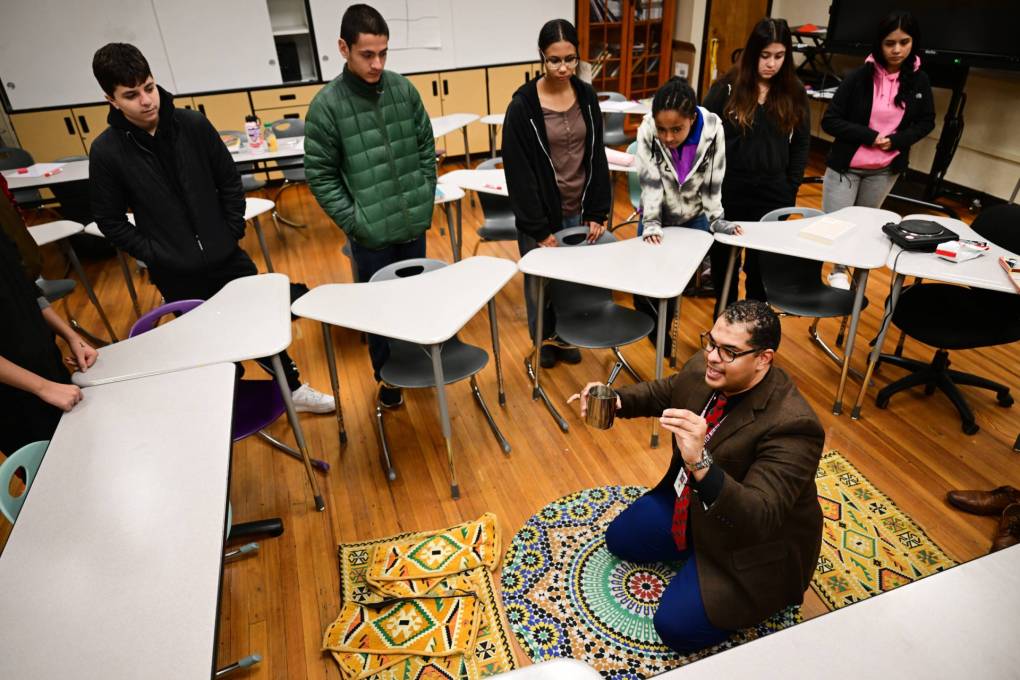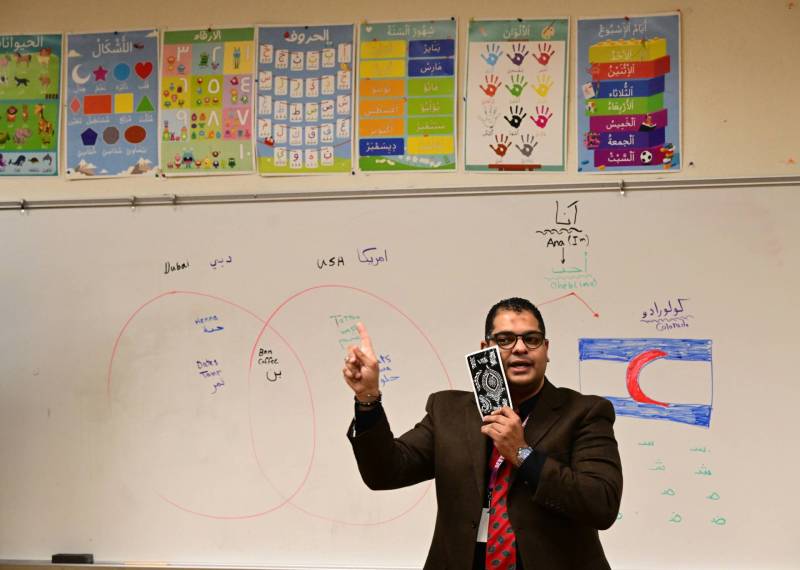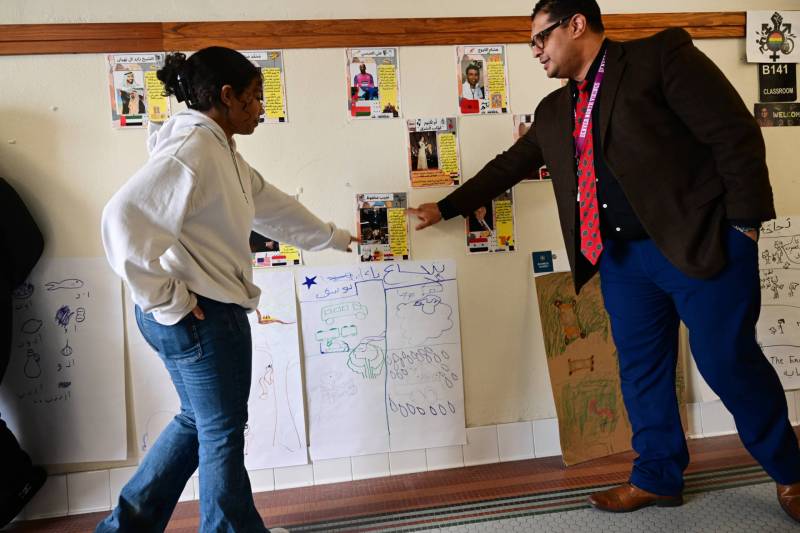
In a new Arabic program, a Denver teacher is connecting students with family and new cultures
Although Arabic is the third most commonly spoken language in Denver Public Schools, Moghazy’s program at North is currently the only one in the district.
This semester, Moghazy is teaching four sections and ready to expand into the third level of Arabic language and Arabic language arts next school year. He records most of his lessons, hoping one day to connect with other teachers who might also want to start their own Arabic programs.
For him, the classes are a way to help students learn a language, reconnect with families, and discover parts of their identity they may not have had a chance to learn about before.
“Maybe they know how to speak at home but didn’t learn how to write or read, so when they see someone doing it, they get motivated,” Moghazy said. “Maybe they used to hide their identity because there’s a misconception between Arabic and Islam.”
His students also include native English speakers or native Spanish speakers who want to learn about other cultures.
One day a week, his lessons focus on culture more than just the language: learning a new dance, drinking and tasting Arabic coffee, comparing how Arabic might sound different in various regions, or learning about henna tattoos and comparing their meaning to tattoos used in other cultures.
Now, Moghazy has a vision of expanding his Arabic language program by following in the footsteps of the Spanish language arts program at North that is the most developed in the district. He likes the idea of preparing students to pass translation or interpretation certification and earn college credit.
And Moghazy is an enthusiastic proponent of the benefits of learning Arabic, pointing out that it is the official language of 22 countries, one of six official languages of the United Nations, and spoken by 500 million people around the world.
“It’s opening more opportunities for them,” Moghazy said, referring to the students taking his classes. “It’s important that kids learn more than one language.”

Spanish language arts path serves as inspiration
As Moghazy looks to expand his program, he is using North’s Spanish language arts program – the only one in the district that has a new partnership with Metropolitan State University – as a model.
Teacher Inmaculada Martín Hernández organized the Spanish language program so students earn a Seal of Biliteracy on their high school diploma and are prepared and close to earning a certificate to become translators. Those who transfer to Metro also have all the credits necessary for a college minor in Spanish.
The Spanish language arts programs in the district were started to help students identified as English learners because having a language arts class in their home language helps their learning in other content courses, Hernández said.
Because Hernández has a PhD, a doctorate in literature, she is able to teach more advanced concurrent enrollment courses that offer students college credit. Moghazy also already has a doctorate of education in learning design, so is also able to offer college credit in his classes.
“Spanish native speakers struggle to get to college, but once they have the opportunity to be successful, they realize they can take Spanish classes,” Hernández said, “and it’s like the door for them.”
District leaders said they are working to expand Spanish language arts courses across the district and just rolled out a common curriculum that teachers can use instead of creating their own. Some classes are offered online so students can benefit even if the qualified teacher for the course isn’t at their school. The number of heritage Spanish speakers taking Spanish language arts classes in the district grew from 1,863 to 2,196 in the past year.
Spanish language arts is also part of the district’s court-mandated consent decree agreement for serving Spanish-speaking learners. The agreement mandates many specific services for English learners whose home language is Spanish, but doesn’t hold the district to all the same requirements for students with other native languages.
In most cases, language arts classes that aren’t in English count as elective or language credits – not as language arts. District leaders want to work with the state to change that, but there are a few pieces to figure out first, including how it would change the requirements for teachers to be able to offer the classes.
It’s been hard to maintain similar programs in other languages, district leaders say, in part because few teachers are qualified. Denver used to have Arabic language programs at other schools including at South High School, where the district houses a program for new immigrant students.
But as teachers leave, often the program disappears with them.
“In terms of building these programs, all of the desire is there and we know we have the students to support it,” said Andrea Caulfield, the district’s world languages curriculum specialist.
Spokespersons for Aurora and Adams 12 school districts, two districts with large portions of refugee students, said they aren’t aware of any Arabic language programs in their schools.

Students cite many reasons for wanting to learn Arabic
Besides teaching Arabic and planning the expansion of the program, Moghazy also mentors a handful of newer immigrant students who speak Arabic. Teachers for other content classes send him assignments that he translates for the students so they can participate.
It’s a lot of work, but he said, “I’m happy to do that. I was one day in the same position and it was hard.”
Sophie Kruzel, 14, is another student in the Arabic language program. Her family is also from Lebanon, and she said her family’s been excited to hear her learning the language.
Some students tell Moghazy they dream of traveling to Dubai or working with the United Nations. Sophie and Rachel both said they’re considering careers working with refugees. Besides the joy in connecting with families, they hope learning Arabic also helps them in that future work.
“That’s really important work for me,” Sophie said. “There should be more classes like this.”
Moghazy said his work is also about connecting with families.
As he was doing outreach to start the class, for example, he met a woman whose family had just arrived here from Libya. The woman, a mother, said she was worried about how her children would adjust to the new country and to starting high school. She was considering not sending her kids to school, she told Moghazy.
Even though the family was not in the attendance boundary to attend North High School, the woman chose to send her children to North after talking to Moghazy and learning that her students would have an opportunity to take Arabic classes and have a teacher there who could understand them.
“In the Middle East, parents don’t have a voice,” Moghazy said. “When I’m talking to them, telling them, you have a voice they can’t believe it. They feel secure.”
Yesenia Robles is a reporter for Chalkbeat Colorado covering K-12 school districts and multilingual education. Contact Yesenia at [email protected].
Chalkbeat is a nonprofit news site covering educational change in public schools.
Stay connected with us on social media platform for instant update click here to join our Twitter, & Facebook
We are now on Telegram. Click here to join our channel (@TechiUpdate) and stay updated with the latest Technology headlines.
For all the latest Education News Click Here
For the latest news and updates, follow us on Google News.

